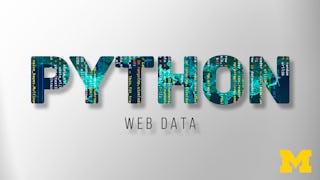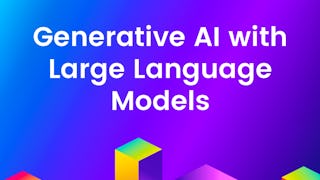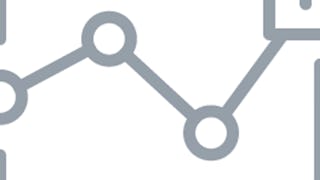Filter by
SubjectRequired
LanguageRequired
The language used throughout the course, in both instruction and assessments.
Learning ProductRequired
LevelRequired
DurationRequired
SkillsRequired
SubtitlesRequired
EducatorRequired
Explore the Computational Science Course Catalog
 Status: Free Trial
Status: Free TrialSkills you'll gain: Large Language Modeling, Artificial Intelligence, OpenAI, Generative AI, Data Ethics, Artificial Intelligence and Machine Learning (AI/ML), ChatGPT, Deep Learning, Business Transformation, Artificial Neural Networks, Digital Transformation, Prompt Engineering, Automation, Machine Learning, Governance, Business Technologies, Natural Language Processing, Computer Vision, Ethical Standards And Conduct, Applied Machine Learning
 Status: Free Trial
Status: Free TrialUniversity of Michigan
Skills you'll gain: Web Scraping, JSON, Network Protocols, Web Services, Restful API, Application Programming Interface (API), Extensible Markup Language (XML), Data Import/Export, Data Access, TCP/IP, Python Programming, Scripting, Hypertext Markup Language (HTML), Data Capture, Text Mining

DeepLearning.AI
Skills you'll gain: Generative AI, Large Language Modeling, OpenAI, ChatGPT, Prompt Engineering, PyTorch (Machine Learning Library), Artificial Intelligence and Machine Learning (AI/ML), Deep Learning, Tensorflow, Applied Machine Learning, Scalability, Natural Language Processing, Application Deployment, Reinforcement Learning, Performance Tuning, Performance Metric

University of London
Skills you'll gain: Crisis Intervention, International Relations, Diplomacy, Advocacy, Human Services, Political Sciences, Social Justice, Public Policies, World History, Governance, Policy Analysis, Systems Thinking, Conflict Management
 Status: Free Trial
Status: Free TrialSkills you'll gain: Data Storytelling, Data Literacy, Data Visualization, Data Presentation, Interactive Data Visualization, Tableau Software, Presentations, Data Visualization Software, Dashboard, Web Content Accessibility Guidelines
 Status: Free Trial
Status: Free TrialUniversity of California, Irvine
Skills you'll gain: Test Planning, Embedded Systems, Linux, Internet Of Things, Embedded Software, Functional Requirement, Debugging, General Networking, Hardware Design, Systems Design, Operating Systems, Requirements Analysis, Electronic Hardware, System Design and Implementation, C (Programming Language), Basic Electrical Systems, Application Programming Interface (API), TCP/IP, Wireless Networks, Integrated Development Environments

University of Toronto
Skills you'll gain: Programming Principles, Debugging, Software Documentation, Python Programming, Computer Programming, Program Development, Integrated Development Environments, Data Structures, File Management

Duke University
Skills you'll gain: Environmental Monitoring, Environmental Regulations, Environmental Laws, Data Ethics, Environmental Science, Geospatial Information and Technology, Ethical Standards And Conduct, Global Positioning Systems, Research, Image Analysis, Data Collection

Università Bocconi
Skills you'll gain: Food and Beverage, Hospitality Management, Restaurant Management, Product Quality (QA/QC), Global Marketing, Market Dynamics, Business Strategy, Consumer Behaviour, Value Propositions, Competitive Analysis, Innovation, Brand Management, Growth Strategies
 Status: Free Trial
Status: Free TrialSkills you'll gain: Network Security, Hardening, Network Protocols, Network Architecture, Intrusion Detection and Prevention, TCP/IP, Vulnerability Assessments, Computer Networking, Cybersecurity, Network Infrastructure, Firewall, Cloud Computing, Virtual Private Networks (VPN)
 Status: Free Trial
Status: Free TrialMultiple educators
Skills you'll gain: Apache Airflow, Data Modeling, Data Pipelines, Data Storage, Data Storage Technologies, Data Architecture, Data Transformation, Requirements Analysis, Data Processing, Data Warehousing, Query Languages, Apache Hadoop, Extract, Transform, Load, Data Lakes, Amazon Web Services, Apache Spark, Database Systems, Data Integration, Infrastructure as Code (IaC), Terraform
 Status: Free Trial
Status: Free TrialUniversity of California, Santa Cruz
Skills you'll gain: C++ (Programming Language), Go (Programming Language), Debugging, C (Programming Language), Data Structures, Object Oriented Programming (OOP), Software Design Patterns, Object Oriented Design, Code Review, Programming Principles, Computer Programming, Unit Testing, Algorithms, Command-Line Interface, Program Development, Integrated Development Environments, Software Testing, Computer Science, Computational Thinking, Graph Theory
Computational Science learners also search
In summary, here are 10 of our most popular computational science courses
- Introduction to Artificial Intelligence (AI): IBM
- Using Python to Access Web Data: University of Michigan
- Generative AI with Large Language Models: DeepLearning.AI
- Global Diplomacy: the United Nations in the World: University of London
- Share Data Through the Art of Visualization: Google
- An Introduction to Programming the Internet of Things (IOT): University of California, Irvine
- Learn to Program: The Fundamentals: University of Toronto
- Drones for Environmental Science: Duke University
- Food & Beverage Management: Università Bocconi
- Connect and Protect: Networks and Network Security: Google










